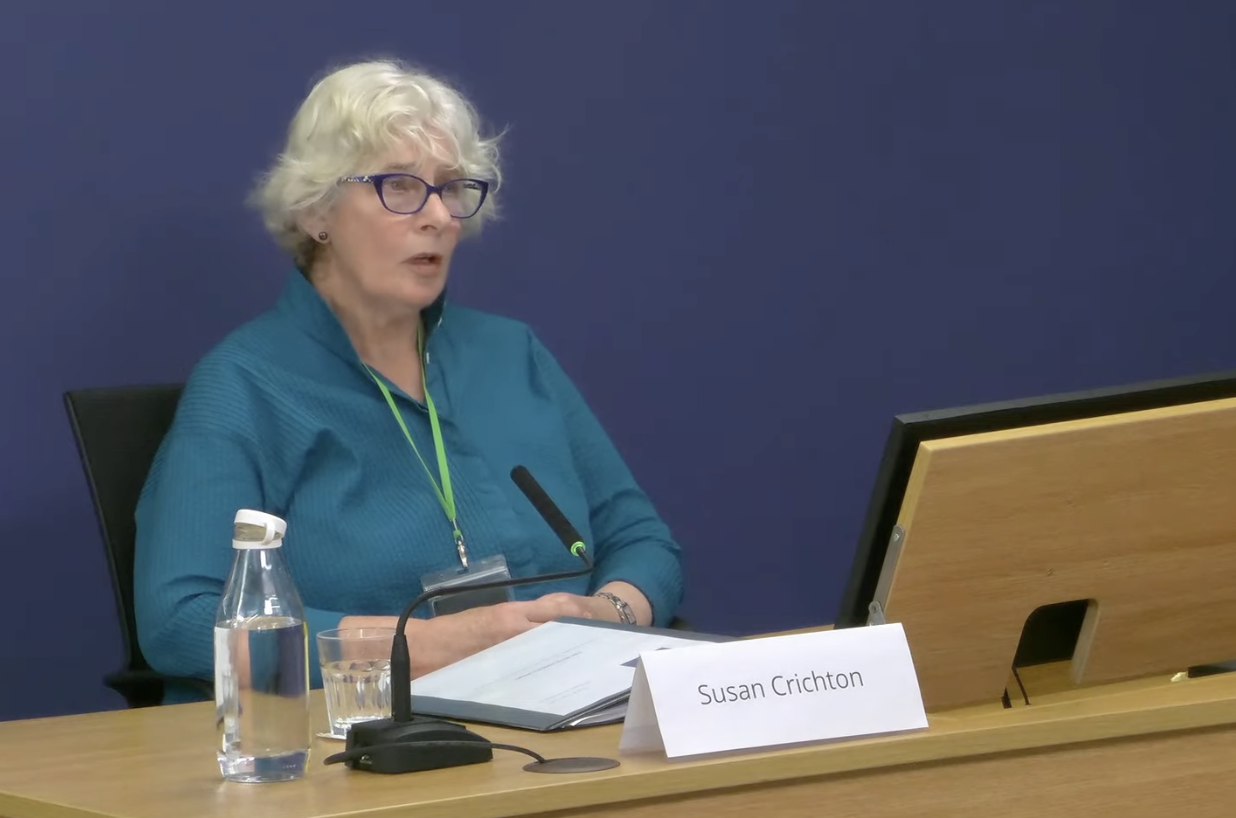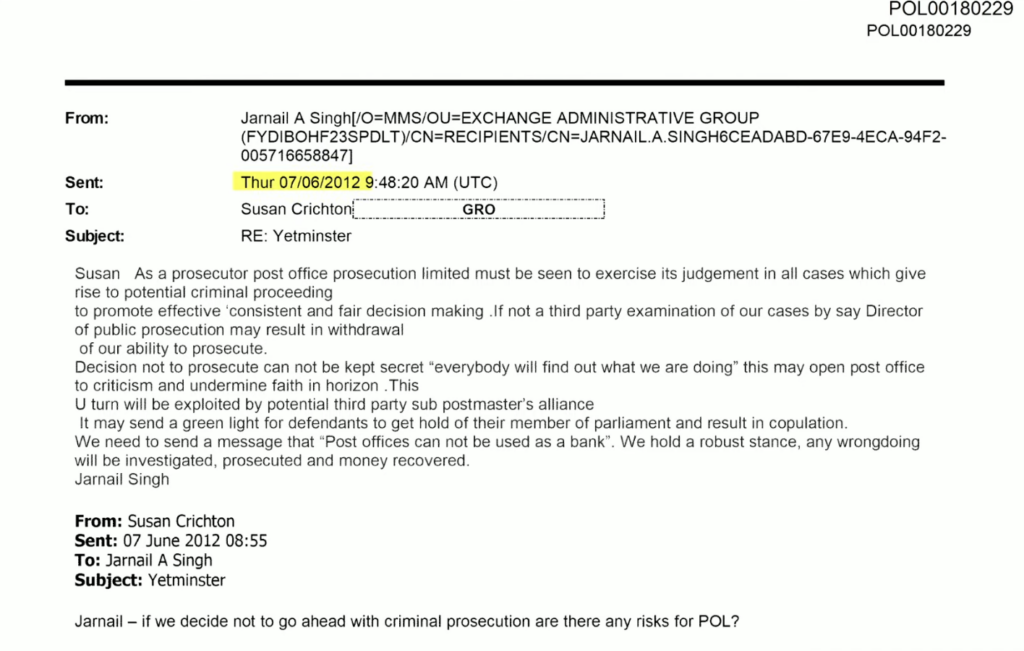
Susan Crichton cut a sorry figure at the Inquiry today. A woman apparently trying to do the right thing, but not trying hard enough. A woman whose stated intentions were not borne out (and occasionally downright contradicted) by the documentary evidence. A woman who came up against a company board more interested in reputation management than the truth, and who, instead of raising the alarm, imploded and walked away.
If you want to read it blow-by-blow, with added documentary evidence, you can, here, on a formatted tweet thread in the live tweets section of this website.
I find it difficult to have sympathy for Crichton. She wanted to do the right thing, which was manage the delivery of Second Sight’s independent (Interim) report, and to some degree she succeeded. She also colluded with her client, the Post Office, to change the language both in the Interim Report (a late draft was considered too “emotional”) and around it (Second Sight – and Fujitsu’s – references to “bugs” were regurgitated by her in external and internal Post Office comms at the suggestion of CEO Paula Vennells’ husband as “exceptions” or “anomalies”). Crichton even sought, on behalf of the Post Office, advice on whether Second Sight could be sued for defamation, or whether the Post Office could injunct their report.
Some time ago I spoke to Second Sight’s Ron Warmington about Crichton and whilst he admitted being “perplexed and puzzled” by her ten year silence on leaving the Post Office in 2013, he maintains she was “one of the few people with integrity” within the Post Office. According to Ron, she pushed for an independent investigation, and once Second Sight had been selected she “did what she could” to “protect” them from the malign forces within the Post Office trying to shut them down.
His word carries far more weight than mine, but from her evidence today, it seems Crichton was also far less interested in what had happened to the Subpostmasters than she was about her own career. Once Alice Perkins (the Post Office chair) had decided to make her a scapegoat for failing to manage the Second Sight report into something more palatable, Crichton got out as quickly as she could. She then sat on what she knew without (as far as we know) doing anything to bring the plight of the Subpostmasters to light publicly, or privately. I find this surprising, if not reprehensible. She had experienced the Post Office’s mafia culture first hand and come off worse, but unlike the Subpostmasters, she got away with a tidy settlement and her reputation intact.
I would like to have asked Ron what he made of Crichton’s evidence, but he’s in purdah, awaiting his own evidence session on 18 June.
The board want to sack Second Sight
Second Sight’s Interim Report was issued on 8 July 2013. Two days later a Bond Dickinson lawyer attending a meeting with Crichton notes that “The board want to sack SS [Second Sight] and of course are now not coping well with the fact that they are independent.”
The lawyer, Simon Richardson, also notices:
“There was generally an overall defensive air and the board are also feeling bruised. There are tensions between people and that includes Alice Perkins (the Chair), Paula Vennells (CEO) and SC [Crichton].”
When asked why, Crichton told the Inquiry that she felt she was being accused of “not managing the process properly” – ie failing to get the independent investigators deliver the result the Post Office wanted.
We are then taken to the minutes of a Post Office board meeting on 16 July 2013, during which Crichton stood outside waiting to deliver her findings into the fallout from the Second Sight report. At Alice Perkins’ request, she was not invited in. Paula Vennells delivered the findings instead. Crichton is informed by Alwen Lyons, the Company Secretary, that she is no longer required. She is humiliated. It is the beginning of her end.
Perkins takes aim
The Inquiry was taken to a note of a meeting between Crichton and Perkins made by Perkins. Perkins tells Crichton:
“the Second Sight interim report and the timing of its publication had been potentially very serious indeed for the Post Office in terms of our national reputation and the effect it could have on our funding negotiations with the Government. In the event, it had not come out so badly partly because of the way the Minister had handled her statement in the House of Commons. But it had been very worrying at the time.”
Perkins note continues:
“I understood that Second Sight’s investigation had to be independent but in the civil service there would have been someone marking it who was close to all the key people (SS, JA [James Arbuthnot], JFSA [Alan Bates’ Justice for Subpostmasters’ Alliance]) and knew what was going on between them.”
Perkins also blames Crichton for getting Second Sight appointed, despite Crichton stepping back from that process because she knew Second Sight MD Ron Warmington from working with him at General Electric.
Second Sight’s reward for getting their report over the line is outlined in an internal email from Perkins to many of the senior leaders within the Post Office on 31 July 2013 which states:
“while it is clear that we are committed to using SS for the 47 [Subpostmaster] cases which are already in the frame for their review, it is extremely important that we cap their involvement at that. The moment they are involved in additional cases beyond these, we will have lost the ability to end the relationship with them – an outcome which I do not want to have to contemplate.”
So much for her commitment to the truth, or indeed any concern for the Subpostmasters.
The inquiry then dwelt on Crichton’s highly confused handling of the Shredding Advice and her inability to properly explain away the actions and emails of her direct report John Scott, who allegedly issued an order to shred minutes of a Horizon issues meeting after Crichton allegedly said she wanted to keep things below the radar.
Yelling at Paula Vennells in a Costa
Finally we came to an extraordinary document made by Paula Vennells detailing two meetings she had with Crichton. In the first, Vennells meets Crichton on what is documented as 30 Sep 2013, but which Crichton and counsel to the Inquiry Julian Blake agree must be 30 August 2013. The two execs are in a Costa Coffee in Old Street. Vennells says she discusses the need to “right the wrong” of Crichton’s actions.
Crichton was apparently “very very angry. She yelled at me” reports Vennells. The anger stems from Vennells’ failure to send Crichton the terms of reference for an internal “lessons learned” review, presumably set up to ensure no-one at the Post Office inadvertently lets the truth out of the bag ever again. Crichton felt again she was being scapegoated for “not managing the process properly”, that is, letting Second Sight do their jobs. Vennells writes:
“She shouted that she was looking at other jobs. She threatened that we would have to back her – implying the importance of references.”
It doesn’t sound pretty. Crichton claims no recollection of the meeting at all, but says the behaviour described is out of character, especially in a public place.
There follows Vennells’ killer paragraph:
“My reflection on what happened with SS as I write this today (2/9/13), is that Susan was possibly more loyal to her professional conduct requirements and put her integrity as a lawyer above the interests of the business. She did not communicate clearly what she was concerned about. If as she says she felt compromised (personally and for the business) by being asked to manage SS more closely, then her misjudgement was that she did not make that clearer to me on the two or three occasions that I asked her to do so.”
Heaven forfend Crichton should put her personal or professional integrity before the Post Office. Professor Richard Moorhead has already seized on this as an indictment of Vennells’ appalling leadership and judgment. But what I would add is that whilst Crichton was clearly under huge amounts of pressure for having allowed Second Sight to open a can of worms, she was partly compromised by her own behaviour.
Crichton’s personal integrity was very much missing when she was seeking advice on suing or injuncting Second Sight, or getting them to tone down their report for being too emotional, or failing to investigate John Scott or reacting more firmly to the explosive first Clarke Advice. She only clung to her integrity when the gangsters running the show turned on her. No matter how she tried to paint her conflict with the Post Office board as a noble stand, Crichton’s evidence today amounted to little more than a personal pity party…
… which continues into tomorrow. Paula Vennells is up for three days beginning 22 May and Alice Perkins is up for two days beginning 5 June.
Singh’s light coital relief
Post Office comedy lawyer Jarnail Singh‘s mangling of the language got a laugh in the Inquiry today as he put up a spirited defence (in 2012) of the Post Office’s need to keep prosecuting Subpostmasters despite the evidential basis for doing so looking ever weaker. We think he meant “capitulation”:

A special anniversary
Today is the third anniversary of the quashing of 39 Subpostmaster convictions at the Court of Appeal. Here is Janet Skinners’ take:
3 years ago today, we made history together. Who would have thought we would still be fighting for justice and redress. Happy 3rd anniversary to each and everyone one of the 39, what a day. pic.twitter.com/smdaaFrEGC
— Janet skinner (@Janetsk20073533) April 23, 2024
Here’s a link to my newsletter from that day, my blog post and picture gallery.
I am currently touring Post Office Scandal – the Inside Story. Please do come and see us as we make our way around the country (all dates here).
The journalism on this blog is crowdfunded. If you would like to join the “secret email” newsletter, please consider making a one-off donation. The money is used to keep the contents of this website free. You will receive irregular, but informative email updates about the Post Office Horizon IT scandal.

Leave a Reply